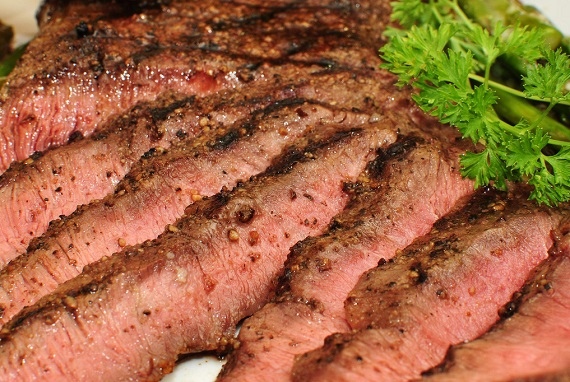


Australia's most comprehensive organic and natural directory
Blog / Food
01 Aug 2016Health Benefits of Organic Grass Fed Beef

One of the most controversial foods on earth is definitely red meat. Humans have been consuming red meat throughout history, but in the last few decades red meat has received a lot of bad press and has caused a divide within the health conscious community.
It is important to note that studies done on red meat do not differentiate between organic, grass-fed meat and factory farmed, processed meat. These studies are also observational in nature, which means they cannot prove causation, only correlation.
It is crucial to understand that processed, factory farmed meat is raised with hormones, antibiotics and grain-based feed which affects the health and nutritional value of the meat. This meat is often heavily processed afterwards which has negative health effects. Organic, grass-fed, free-range beef comes from animals which have been allowed to roam freely, eat their natural food source and are not given hormones or routine antibiotics.
With this in mind, here are some of the health benefits of organic, grass-fed beef.
Grass-fed beef contains a highly absorbable and easy to assimilate form of iron called heme iron. Plants contain non-heme iron which is not as easy for the body to utilise.
Grass-fed beef contains a much healthier fat profile than conventionally raised beef, including being lower in saturated fats and total fat and having greater amounts of the anti-inflammatory omega-3 fatty acids. This is due to the free-range cows being allowed to eat a variety of forage crops.
Grass-fed red meat is an excellent source of minerals like zinc, iron, magnesium, copper, chromium, selenium and others, in a highly bio-available form.
Conjugated Linoleic Acid (CLA) is a fatty acid that is associated with health benefits such as immune support, anti- inflammatory support, improved blood sugar control, weight loss and reduced risk of heart disease. Grass-fed beef provides about two to three times the amount of CLA found in conventional beef.
Red meat is a rich source of vitamins B1, B2, B3, B5, B6 and folate. It is also one of the few sources of vitamin B12 which is needed for the proper functioning of virtually every body system. B12 deficiency can lead to fatigue, anaemia, neurological disorders, infertility and other health issues. Grass-fed beef is a great source of Vitamin D and has been shown to be more absorbable than vitamin D found in milk.
Many of the health risks associated with eating red meat are due to the cooking methods used. When meat is cooked at a high temperature or is burnt this forms harmful compounds called heterocyclic amines (HAs), polycyclic aromatic hydrocarbons (PAHs) and advanced glycation end-products (AGEs). These substances have been linked to cancer and other health issues. To avoid these compounds you should use gentle cooking methods like stewing, and only grill or fry meat at medium heat. Never expose meat directly to a flame and always cut off any burnt or charred sections before eating.
Choosing to eat organic, grass-fed beef is a compassionate decision that will not only benefit your health, but the health of the environment.
Sources
http://chriskresser.com/red-meat-it-does-a-body-good/
http://articles.mercola.com/sites/articles/archive/2012/06/28/grass-fed-beef-a-healthy-diet.aspx
https://authoritynutrition.com/is-red-meat-bad-for-you-or-good/








